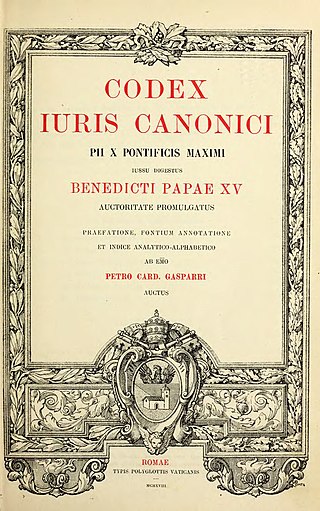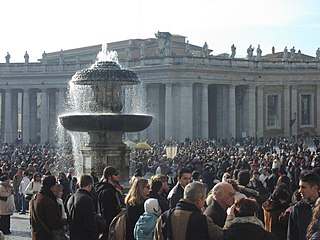This article needs additional citations for verification .(February 2018) |
 |
| Part of a series on the |
| Canon law of the Catholic Church |
|---|
| |
This is a sortable, incomplete, list of motu proprios by pontifical authors.
| Motu Propio | Pope | Year | Content / phrase |
|---|---|---|---|
| Ad beatissimi Apostolorum | Benedict XV | 1914 | First world war |
| Ad tuendam fidem | John Paul II | 1998 | Oriental and Latin codes of canon law |
| Ai nostri tempi | Francis | 2013 | on criminal matters / Ai nostri tempi il bene comune è sempre più minacciato dalla criminalità transnazionale e organizzata |
| Aperuit illis | Francis | 2019 | Establishing the Sunday of the Word of God |
| Bibliorum Scientiam | |||
| Bonum sane | Benedict XV | 1920 | practices of honoring St. Joseph during the month of March |
| Come Una Madre Amorevole | Francis | 2016 | Apostolic Letter Issued Motu Proprio on (2016-06-04) [1] |
| Crux Pectoralis | Pius X | 1905 | Crux pectoralis, quamvis sit particulare signum episcopalis dignitatis |
| Cum proxime | Pius XI | 1922 | Periode of Interregnum changes on behalf of American Cardinals |
| De concordia inter codices | Francis | 2016 | Changes in canon laws of the Roman Catholic Church [2] |
| Dolentium Hominum | John Paul II | 1985 | Pastoral care for the sick and erection of the Pontifical Council for the Pastoral Care of Health Care Workers. |
| Ecclesia Dei | John Paul II | 1988 [3] | |
| Ecclesiae Sanctae | Paul VI | 1966 | Promulgation of and norms for implementation of several Decrees of Vatican Council II, including Christus Dominus, Presbyterorum Ordinis, Perfectae Caritatis, Ad Gentes Divinitus [4] |
| Fides per Doctrinam | Benedict XVI | 2013 | Fides per doctrinam sustineatur oportet, quae credentium mentem corque illuminare valeat / whereby the Apostolic Constitution “Pastor Bonus” is modified and competence for catechesis is transferred from the Congregation for the Clergy to the Pontifical Council for Promoting the New Evangelization |
| Fidelis Dispensator Et Prudens | Francis | 2014 | Established a new coordinating agency for economic and administrative affairs of the Holy See and the Vatican City State. [5] |
| Humanam Progressionem | Francis | 2016 | Instituted the Dicastery for promoting Integral Human Development [6] |
| Humani Generis Redemptionem | Benedict XV | 1917 | Christian preachers and an ever-decreasing effect of their preaching |
| I Beni Temporali | Francis | 2016 | I beni temporali che la Chiesa possiede sono destinati a conseguire i suoi fini e cioè il culto divino / Regarding certain competencies in economic-financial matters [7] |
| In Cotidianis Precibus | Pius XII | 1945 | |
| In Fructibus Multis | Paul VI | 1964 [8] | |
| In hac Beatissimi Petri | Pius X | 1910 | In hac Beatissimi Petri Cathedra ad procurandum Catholicae Ecclesiae |
| Ingravescentem aetatem | Paul VI | 1970 | On Voting Cardinals in the Conclave / Ingravescentem aetatem inter et aptitudinem ad quaedam maioris momenti officia |
| Integrae Servandae | Paul VI | 1965 [9] | |
| In Praeclara Summorum | Benedict XV | 1921 | Sixth centenary of the death of Dante |
| In Romanae Curiae | Pius X | 1910 | In Romanae Curiae ordinatione, per Constitutionem Sapienti Consilio decreta... |
| Intima ecclesiae natura | Benedict XVI | 2012 | Apostolic Letter issued Motu Proprio on the Service of Charity, opening words in English: The Church's deepest nature ... [10] |
| Le più colte | Pius VII | 1801 | Trade Liberalization |
| Magnum principium | Francis | 2017 | Apostolic Letter Issued Motu Proprio on the authority and process of translating liturgical texts [11] |
| Maiorem hac Dilectionem | Francis | 2017 | Apostolic Letter Issued Motu Proprio on the Oblatio Vitae ("offer of life"), 11 July 2017 [12] |
| Maximum illud | Benedict XV | 1919 [13] | |
| Ministeria Quaedam | Paul VI | 1972 | On first tonsure, minor orders and the subdiaconate (15 August 1972) [14] |
| Ministrorum Institutio | Benedict XVI | 2013 | Ministrorum institutio sacrorum inter praecipuas Concilii Oecumenici Vaticani II / whereby the Apostolic Constitution Pastor Bonus is modified and responsibility for seminaries is transferred from the Congregation for Catholic Education to the Congregation for the Clergy |
| Mitis Iudex Dominus Iesus | Francis | 2015 | Reform to the Canons of the Code of Canon that pertain to the marriage nullity cases. [15] |
| Mitis et Misericors Iesus | Francis | 2015 | Reform of the canons of the Code of Canons of Eastern Churches pertaining to cases regarding the nullity of marriage [16] |
| Mysterii Paschalis | Paul VI | 1969 | Reorganisation of the liturgical year |
| Nobilissimam Sacrarum | Benedict XV | 1917 [17] | |
| Omnium in Mentem | Benedict XVI | 2009 | |
| Normas Nonnullas | Benedict XVI | 2013 | Normas nonnullas per Apostolicas Litteras / on certain modifications to the norms governing the election of the Roman Pontiff |
| Organi Giudiziari | Francis | 2013 | Apostolic Letter Issued Motu Proprio On the Jurisdiction of Judicial Authorities of Vatican City State in Criminal Matters (11 July 2013) [18] |
| Pontificalis Domus | Paul VI | 1968 | |
| Prevenzione Contrasto | Francis | 2013 | Apostolic Letter Issued Motu Proprio for the Prevention and Countering of Money Laundering, the Financing of Terrorism, and the Proliferation of Weapons of Mass Destruction [19] |
| Quando per ammirabile disposizione | Pius VII | 1816 | Fiscal and criminal justice reform, abolition of torture |
| Religiosorum Ordinum | Pius X | 1906 | Religiosorum Ordinum familias, utpote quae praeclaro semper et adiumento |
| Rubricarum Instructum | John XXIII | 1960 | Revision of the Breviary |
| Quartus Iam Annus | Benedict XV | 1918 [20] | |
| Quod Iam Diu | Benedict XV | 1918 | |
| Sacramentorum Sanctitatis Tutela | John Paul II | 2001 | Promulgation of Norms on more grave delicts reserved to the Congregation for the Doctrine of Faith [21] |
| Sacrorum antistitum | Pius X | 1910 | Oath Against Modernism [22] |
| Sanctuarium In Ecclesia | Francis | 2017 | Apostolic Letter Issued Motu Proprio on (2017-02-11) [23] |
| Sedula Mater | Francis | 2016 | Apostolic Letter Issued Motu Proprio on (2016-08-15) [24] |
| Segreteria Comunicazione | Francis | 2015 | Apostolic Letter Issued Motu Proprio on (2015-06-27) [25] |
| Statuti Segreteria Per Economia | Francis | 2015 | Apostolic Letter Issued Motu Proprio on (2015-02-22) [26] |
| Statuto Aif | Francis | 2013 | Apostolic Letter Issued Motu Proprio on (2013-11-15) [27] |
| Statuto Accademia Vita | Francis | 2016 | Apostolic Letter Issued Motu Proprio on (2016-10-18) [28] |
| Statuto Dicastero Famiglia Laici Vita | Francis | 2016 | Apostolic Letter Issued Motu Proprio on (2016-06-04) [29] |
| Statuto Dicastero Servizio Sviluppo Umano Integrale | Francis | 2016 | Apostolic Letter Issued Motu Proprio on (2016-08-17) [30] |
| Statuto Segreteria Comunicazione | Francis | 2016 | Apostolic Letter Issued Motu Proprio on (2016-09-06) [31] |
| Summorum Pontificum | Benedict XVI | 2007 | About the Roman Liturgy before the reform of 1970. |
| Summo Sane | Pius X | 1905 | Summo sane afficimur gaudio quod in Patriarchali Seminario Venetiarum Iuris canonici Schola |
| Supremum Officium | Pius X | 1912 | |
| Supremi Disciplinae | |||
| Trasferimento Apsa | Francis | 2014 | Transferral of the Ordinary Section of the Administration of the Patrimony of the Apostolic See to the Secretariat for the Economy (8 July 2014) [32] |
| Tra le Sollecitudini | Pius X | 1903 | Regulations for the performance of music in the Roman Catholic Church |
| Traditionis custodes | Francis | 2021 | Restricting celebration of the Tridentine Mass (16 July 2021) [33] |




